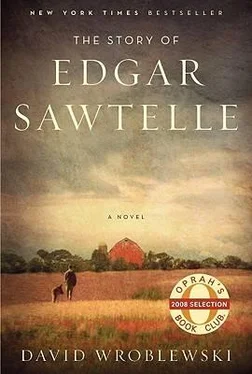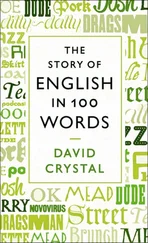One of the dogs-Essay?-porpoised out of the weeds in the middle of the field and the others followed, arcing and disappearing into the deep grass. He stood and clapped and they worked their way across the field, zigzagging and leaping, until at last Essay burst into the clear. She carried in her jaws an enormous brown-and-black garter snake, thick in the belly and almost as long as she. She stopped near Edgar and shook it until its lifeless body writhed in the air. Baboo and Tinder whisked past, trying to snatch her prize. She trotted one way then another, until finally Tinder got hold of the snake’s tail. After a struggle, the snake separated into two parts with a string of entrails quivering between. Baboo and Tinder repeated the process with the rear half of the snake until each dog retreated with their portion.
Ugh, God, Edgar thought, turning away, not so much disgusted by the idea of their eating a snake (though garter snakes smelled foul) as their eating it raw. He wondered if the matches in his pocket were still dry; he could cook the snake for them. But by the time he dressed, nothing was going to be left. The dogs had to be ravenous, if his own stomach was any indication. Nothing else felt half as important as finding food.
He dressed in his damp clothes and gathered the dogs and they waded up through quack grass and milkweed and mullein, the dogs skating around him in wild, hooped orbits improvised on the theme of his path. The old barn stood beside a weed-shot blacktop road with no house in sight. It was the first barn they’d seen in their travels and Edgar took it as a sign they’d finally crossed the Chequamegon and were in farmland again. He pressed his eye to one of the thumb-width spaces in the barn’s siding boards. Inside sat a disk harrow and a moldboard plow, each with its spooned metal seat, and a dilapidated hay wagon whose framework back sagged like a frowning thespian mask. At the far end, an antique sower made of rusty knives and funnels. Irregular planes of light striped the machinery and the hay-strewn dirt floor as if he were looking through the ribs of a great bird-picked carcass at whatever had eaten it from within and been trapped.
The dogs ignored the barn and poked along the dilapidated barbed-wire fence bordering the road, nosing the fireweed and morning glory twisting up the fence posts. Edgar walked to the pavement. Not even the shadow of a centerline. The dogs were acting downright gay, he thought, watching them run toward him, as if relieved to have returned to the itinerant life after being pinned down in the rain. They crossed a shallow ditch together and passed through a line of trees, where an orderly two-stranded barbed-wire fence stood. The dogs slipped beneath, hardly breaking stride.
Before them stood an up-sloping field of sunflowers taller than Edgar-row upon row of sage trunks topped by hairy, fluted plates, all pointed off angle to the risen sun. They walked the edge of the sunflowers for easy traveling until a car appeared distantly on the blacktop. Edgar turned for one last look at the desiccated barn, then clapped his leg and they ducked into the gap between two infinitely receding rows of sunflower stalks.
T HEY WERE HALFWAY DOWN THE FAR SIDE OF THE FIELD BEFORE the sunflowers dwindled into an open patch and Edgar stopped to look around. At the bottom of the slope the field ended at a tree-filled farmyard. The house was simple and square, with attic dormers and plain brown asphalt shingling. A long driveway hooked around behind the house to stop at a freestanding building that looked like a carriage house or shed. In front of the shed sat a battered old car. No one was walking around, no dogs lay on the back porch, no sound emanated from the small barn at the back of the yard. All he could hear was the collective hum of thousands of bees harvesting the sticky nectar glinting on the sunflower heads. The field itself was long and narrow, an alley bounded on one side by a barbed-wire fence and on the other by a solid stretch of woods. Over the treetops rose a water tower, aquamarine and round-bellied. Wide-spaced cumulus clouds languished above it all in shades of white and blue, their shadows tracing the contoured land. The name of a town was painted on the water tower’s barrel in tall white letters: Lute.
He clapped the dogs over and held their muzzles in his hand and ran his fingertips around their gums to see how thirsty they were. It gave him a chance to gauge whether Essay was in the mood to bolt or to stick, whether Tinder or Baboo were fretful. When he was satisfied that they would stay nearby-when the four of them agreed on that-they made their way to the edge of field.
During his thief’s apprenticeship, Edgar had learned not to waste much time speculating on whether a place was unoccupied or just looked that way-it was easiest to just walk up and knock. If someone stirred inside, he could always run off. And, too, his hunger made him reckless. He down-stayed the dogs (Essay walked it down inch by inch-they were going to have to practice that) and strode his most innocent walk to the back door. He heard no voices inside, no television, no radio. The sash on the small, square window beside the door was down and latched.
He knocked. When a minute passed (long enough for someone to get out of bed and start walking across the room; long enough for someone to shout, “Who is it?”; long enough for a dog to bark) he opened the screen door and tested the inside knob. To his surprise, the door swung inward and he stood looking into a neat, linoleumed kitchen with a Christmas floor mat just inside. He leaned in and knocked again, louder this time. The only reply was the click of the refrigerator compressor shutting off.
He took one more look around and then it was a mad dash. He threw open the refrigerator. Cans of beer and bottles of Coca-Cola. He grabbed a Coke and rummaged through the cabinet drawers until he found a bottle opener and upended the cold bottle against his lips. From the counter near the door he grabbed a loaf of bread and a bag of potato chips and stepped outside and tried to stroll along, though he knew, in his excitement, he was heel-walking like a dope. A patch of weeds near the edge of the field began to shake. He dove in, awkwardly signing a release before the dogs broke anyway. They weren’t idiots; they knew food when they saw it coming.
He ripped open the plastic wrapper on the bread and handed out slices all around; he gobbled one down himself, then another, following it with big washes of Coke. In a minute, half the bread was gone. He tore open the bag of chips and shoveled them in, chip after salty, crunchy chip. The dogs tried to jam their snouts into the bag. He clamped it shut, then parceled out the delights, with the dogs following his hand each time it disappeared. He smiled, bits of potato chip and bread showing in his teeth. The true depth of his hunger had only then become evident. The sight of all that food almost panicked him-he’d needed to take something modest or he’d have fainted right there in the kitchen.
He sat watching the house again, half-expecting someone to barge out of the door at last, shouting and shaking a fist. The dogs panted in his face as if to say, what are you waiting for? Then they broke into a sprint. There was no holding back. Whoever lived there might come back at any moment and the opportunity would be lost.
This was not going to be elegant, he thought.
The dogs had not been inside a house-or any building, for that matter-for many weeks. They circled skittishly at the threshold until he shooed them in. They entered slinking. He filled a big plastic bowl with tap water and put it down. They leapt forward and slobbered up the water, spookiness vanished, while he rifled the cupboards, setting food aside as he discovered it. When he opened the refrigerator his gaze fell on a package wrapped in white butcher paper. The purple-inked label read, “Bratwurst.”
Читать дальше
Конец ознакомительного отрывка
Купить книгу












